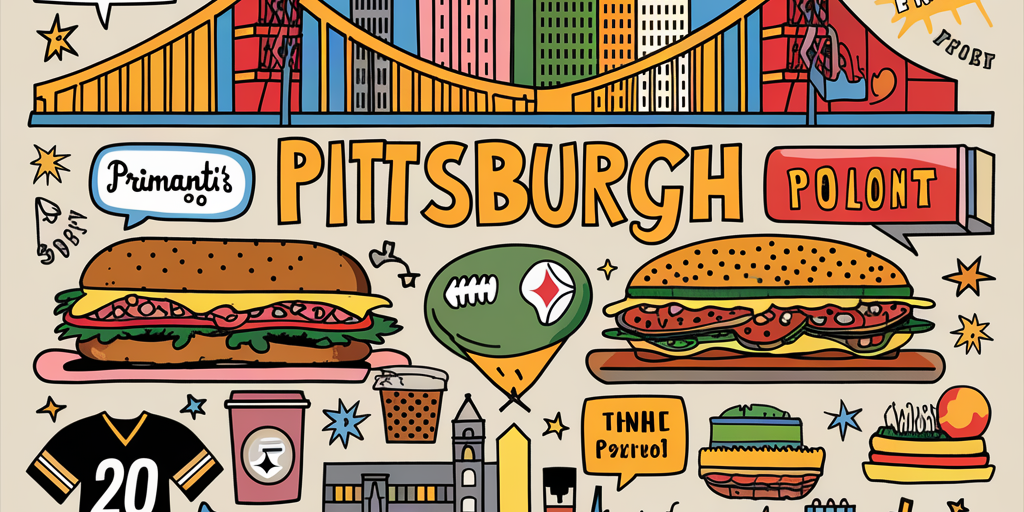The Language of the Steel City
Pittsburgh is a city shaped by its industrial grit, tight-knit neighborhoods, and a language all its own. Known as “Pittsburghese,” the city’s distinctive mix of words, phrases, and pronunciations reflects a rich blend of immigrant roots and working-class culture. It’s a dialect forged in steel mills, shaped in corner bars, and passed down through generations.
To outsiders, Pittsburgh’s lingo might sound quirky—but to locals, it’s a proud badge of identity. Whether you’re talking sports, giving directions, or swapping stories in one of Pittsburgh’s oldest bars, these expressions are more than just slang. They’re cultural shorthand—a living reminder that this city, and its people, speak with a voice that’s entirely their own.
Yinzer Translator
Here’s a guide to 25 words and phrases that are uniquely Pittsburgh — a mix of Pittsburghese, iconic foods, local landmarks, and cultural references that make the Steel City what it is.
1. Yinz
Pittsburgh’s famous version of “y’all” or “you guys.” If you hear “Yinz goin’ dahntahn later?” — you’re definitely in Pittsburgh.
2. Jagoff
A classic Pittsburgh insult meaning a jerk or idiot. Importantly, it’s not considered profanity but a way to call out bad behavior.
3. Nebby
Translation: Nosy or meddlesome. If someone’s “gettin’ nebby,” they’re sticking their nose where it doesn’t belong.
4. Redd Up
To clean or tidy up. Example: “We gotta redd up the house before company comes.”
5. Stillers
How die-hard Pittsburghers pronounce “Steelers.” Usage peaks on Sundays.
6. Slippy
Pittsburgh’s way of saying “slippery.” Example: “Be careful, the sidewalk’s slippy.”
7. Gumband
Translation: Rubber band. “Hand me a gumband to hold this together.”
8. Dahn
Pittsburgh shorthand for “down,” especially when talking about heading downtown: “Goin’ dahn to the Strip.”
9. Sweeper
Not a hockey player — it means vacuum cleaner. “I gotta run the sweeper.”
10. Crick
How many Pittsburghers pronounce “creek.” Example: “We’re goin’ fishin’ dahn at the crick.”
Pittsburgh Foods & Cultural Icons
11. Primanti’s
Short for Primanti Bros., home of the legendary sandwich stuffed with fries and coleslaw.
12. Jumbo
Local slang for bologna. “Pick up a pound of jumbo from the deli.”
13. Chipped Ham
Paper-thin shaved ham, famously from Isaly’s, often turned into BBQ sandwiches.
14. City Chicken
A Pittsburgh classic: skewered pork or veal, breaded and baked like chicken.
15. Pop
What Pittsburghers call soda. “Grab me a pop from the fridge.”
16. Potato Patch
Refers to the famous fry stand at Kennywood Park, known for fresh-cut fries drenched in toppings.
17. Dippy Egg
An over-easy egg perfect for dipping toast. “I’ll take two dippy eggs and bacon.”
18. Pierogi
Thanks to Pittsburgh’s Eastern European heritage, these doughy dumplings stuffed with potatoes, cheese, or sauerkraut are everywhere — from church festivals to stadiums.
Neighborhoods & Landmarks
19. The Point
Locals’ name for Point State Park, where the three rivers meet — a defining image of Pittsburgh.
20. The Strip
Shorthand for the Strip District, Pittsburgh’s bustling marketplace filled with food, shops, and historic warehouses.
21. The Mon
Local way of referring to the Monongahela River, one of Pittsburgh’s three rivers.
22. Three Rivers
When Pittsburghers mention this, they mean the Allegheny, Monongahela, and Ohio Rivers — the lifeblood of the city.
23. Carrick, Bloomfield, Polish Hill
Distinct Pittsburgh neighborhoods with rich immigrant histories. Each has its own vibe and pride.
Sports & Historical References
24. The Immaculate Reception
The most famous play in Steelers history — and maybe NFL history — that sealed Pittsburgh’s place as a football city.
25. Steel Curtain
Refers to both the Steelers’ legendary 1970s defense and Pittsburgh’s historic steel industry.
Speaking Pittsburgh
Speaking Pittsburghese is about more than just playful slang and distinctive accents—it’s a living connection to Pittsburgh’s proud heritage, resilient character, and unique sense of community. Every time you order your Primanti’s sandwich piled high with fries, cheer loudly for the Stillers, or gently remind someone to “redd up” before guests arrive, you’re honoring the city’s distinctive traditions.
This colorful local language has endured through Pittsburgh’s dramatic transformations, from the booming steel-making era, vividly captured in stories about the rise and fall of Pittsburgh’s steel industry, to its modern reinvention as a thriving tech and healthcare hub. Pittsburghese serves as a cultural touchstone, bridging generations and neighborhoods, always reminding Yinzers who they are and where they come from. Like Pittsburgh itself, it remains proudly unique, resiliently authentic, and warmly welcoming—forever linking past, present, and future in a way only the Steel City could.









